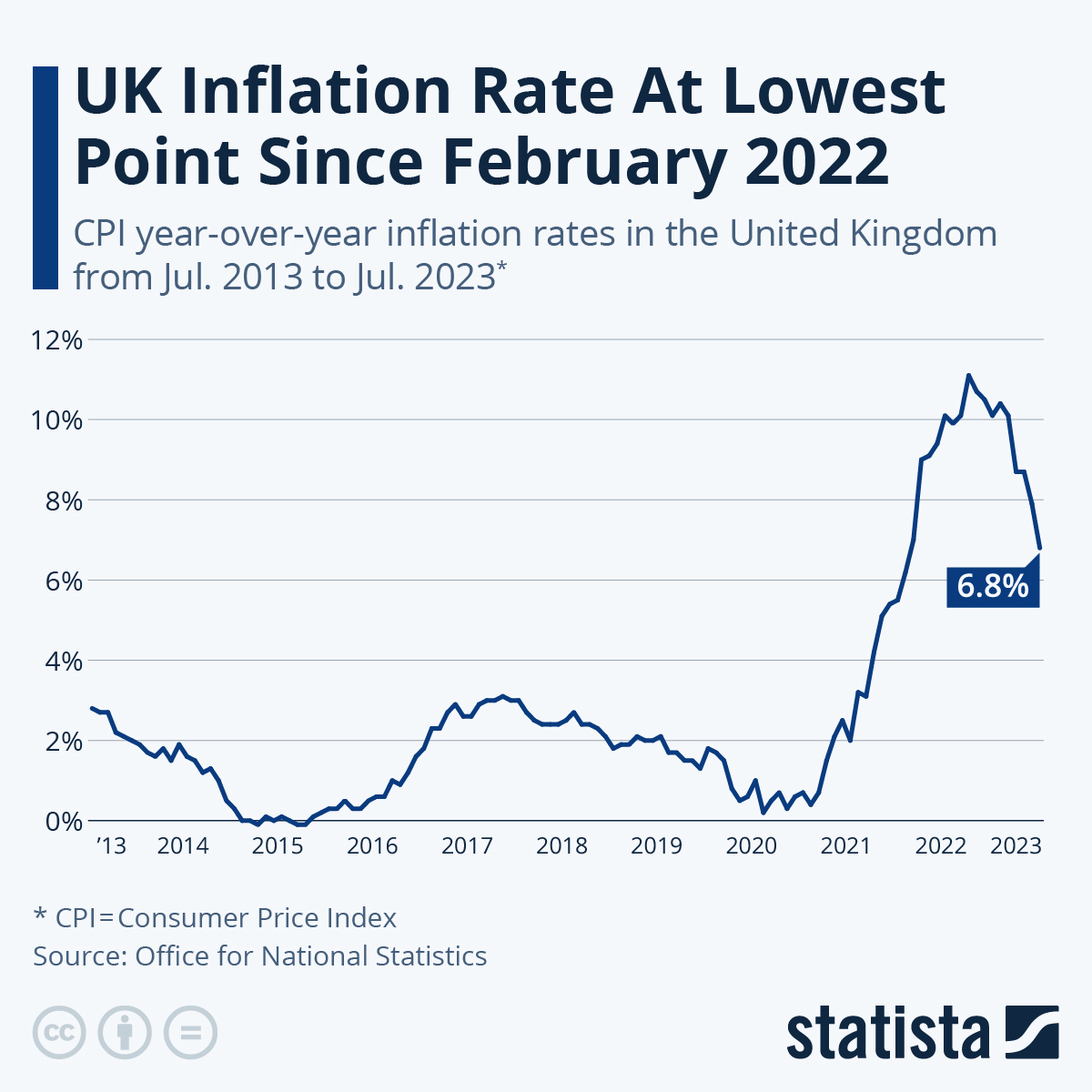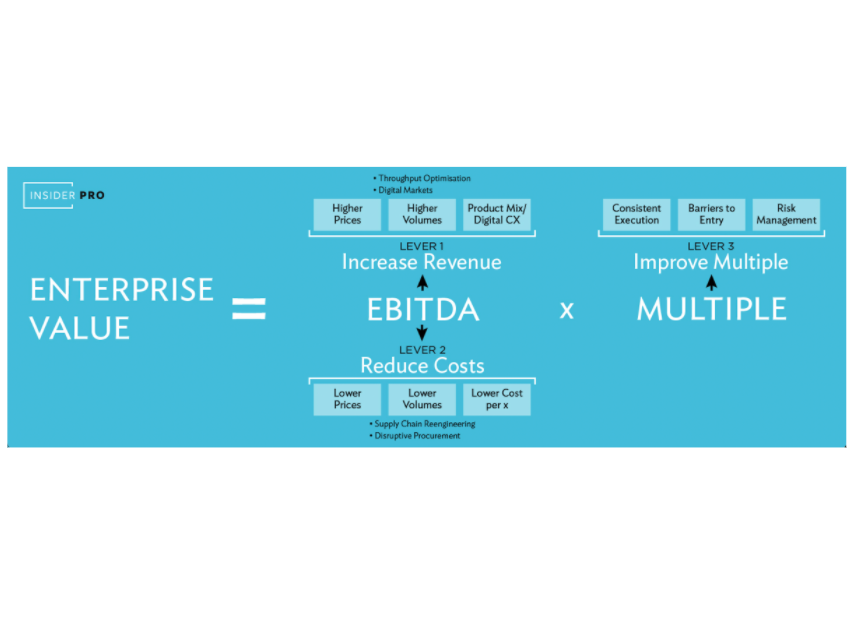In times of high inflation, changes to product specification may identify a great opportunity for cost reduction - a reduction in size, a change to the packaging, a modification of the materials used, or the scope of service provided. All of these (and many more) offer good ways to explore cost reduction and may well reveal acceptable and sensible changes to the design or presentation of an item.
A salesperson using the term 'disinflation' should immediately put your bullshit filters on high.
This rather old-fashioned term dating from 1840 simply means "a reduction in the rate of inflation". For example; Inflation was 8% and now its 4% = disinflation.
Topics: Disruptive Procurement
Insider Pro recently conducted some original research into the pre-pandemic manufacturing sector. We accessed Companies House data for the last 5 years pre-pandemic, for 1500 small and medium sized manufacturing businesses in the UK. The findings show the stark reality about cash and working capital trends, relevant to almost all sectors and organisations, small and large. The insight and learnings can be applied to any business and demonstrate the importance of mapping your supply chain and understanding your key dependencies. Aligning the team around key financial objectives, and making sure they understand how critical it is to manage cash and working capital well will help to build the enterprise value of a healthy, successful business.
Remember, almost every route to higher revenues depends on a reliable and predictable supply chain.
Plan! When forecasting sales, be sure your supply chain can deliver. Big companies have sales and operations planning functions. Smaller ones should bring in some outside help to make sure they are not underestimating the value they can generate from their supply chain.
Source as close to home as you can. Sourcing from low-cost countries may be cheaper but it is often not enough to overcome supply-chain disadvantages, Cost is important but it is not everything.
Make versus Buy – don’t make a component you can source cheaply and reliably. Focus on where you can add value and review service contracts regularly so you are sure you are getting the best price.
Balance where the cash is in the supply chain – don’t pay for goods you’ve not yet received and understand whether your supplier can easily afford to extend credit or not. If a supplier’s cost of capital is higher than yours, you will pay an unnecessary premium for additional credit terms.
Understand your customer. If the cost of capital is very high, the customer will be more motivated to attempt to delay payment.
In conclusion, make sure you pay attention to all these metrics and dials on your metaphorical dashboard. If everything is balanced, revenues will grow but so will profits and cash flow.
Read more about how we came to these conclusions in the UK Manufacturing Barometer – download now at www.insiderpro.co.uk
Topics: Disruptive Procurement, Supply Chain Management, Enterprise Value, Working capital improvement, Cash Flow
Companies aspire to grow for many reasons. To survive, for their employees, for future sale valuation, for an IPO, the incentives are many and varied.
Definitions also vary but at Insider Pro we define Enterprise Value as EBITDA x the MULTIPLE applied.
There are 3 main levers to focus attention on;
- increase revenues,
- reduce costs, and
- improve the multiple to be applied.
Most importantly, you need clarity around how your supply chain and operations will impact these metrics and ultimately your enterprise value.
Revenues – can you set higher prices, increase volumes, improve throughput optimisation and availability, alter your product mix to impact sales?
Costs – through disruptive procurement and working with strategic suppliers, can you reduce cost per X, lower volumes, how can you do things differently and re-engineer the supply chain to reduce the cost of goods and costs of running the business?
Multiple – can you demonstrate consistent execution and stability, and show clear risk management activity? Can you overcome barriers to entry and predict how your competitors will behave? All these will push up the multiple investors are willing to pay.
Why does all this matter? Because if your supply chain and operations teams do not understand the impact of their decisions and actions, they can seriously affect your overall enterprise value. Managing the supply chain is hard and it is critical that all teams, whether Sales, Operations or Procurement are aligned in their understanding and around the company objectives for short, medium and long-term success.
For more real examples of how to impact your supply chain and your enterprise value, download the UK Manufacturing Barometer from www.insiderpro.co.uk now and help to improve understanding of these key metrics.
Topics: Disruptive Procurement, Supply Chain Management, Enterprise Value, Working capital improvement, Cash Flow
There are two routes to growing the value of your business. You can use brute force – just keep cranking up production, run your sales force hot and hope the rest follows, or you can take steps to increase the multiple of profits the business will attract when you come to sell. It’s pretty hard to rely on growth alone. Insider Pro’s Manufacturing Barometer shows that UK manufacturers managed to increase sales by a fifth between 2015 and 2020 before the pandemic – that’s great. But unfortunately, profits haven’t budged. An extra £38bn on the top line hasn’t delivered any additional operating profit. Companies, especially smaller manufacturers, endured a steady margin squeeze that left them less resilient when Covid-19 struck. Higher revenues alone are not enough to build enterprise value.
Of course, the last twelve months have caused a painful hit to industry. Manufacturing has certainly fared better than some parts of the economy like high street retail and hospitality, but even so sales are down around 10% across a broad spread of manufacturing sectors, while profits have approximately halved. Manufacturers are also having to face the messy complications caused by Brexit.
Huge upheaval like this feels awful but it also provides a golden opportunity for a rethink. If you can work both routes at the same time – growing the business and expanding the multiple – then you can really transform the value of your company. There are lots of dials on your metaphorical dashboard that can help you drive higher sales and do so profitably by controlling your costs. If you can grow your profitability 10% but you don’t increase your multiple, then your business is worth 10% more. Not bad. But if you can also get the multiple of profits a buyer would be prepared to pay from 5x EBITDA (operating profit with depreciation added back) to 6x, you’ve just added another 20% right there. Suddenly your business is worth a third more!
Getting your supply chain right goes to the very heart of the issue. These months of crisis have exposed some structural weaknesses in how manufacturers manage their supply chains. A moment of such dislocation makes it easier to reform long-established practices that no longer serve the business well. In any recovery, manufacturers all need to start thinking like growth companies as they come off the back off a ‘low volumes’ year. Scaling up always means stress-testing your supply chain, rather than simply expecting it to grow with you. If your suppliers don’t have capacity, don’t blame them if they can’t keep up, so keep them close and keep an eye on them. Minor problems can quickly balloon as you get bigger.
For example, through the pandemic we have seen how shipping costs can spiral unexpectedly and the availability of product can disappear altogether – supply chains can simply break. Accidents happen too. Indeed, the hullabaloo in the Suez Canal completely severed Asian supply routes in March this year creating all sorts of ripples that took weeks to smooth out. Put simply, a cheap listing price for a component or raw material is irrelevant if getting it to your factory gets pricier, or if you simply can’t get it there at all.
Cash is one of the biggest obstacles for growth, so companies must prioritise cash generation over profit. At Insider Pro we help businesses embed a cash-first culture from boardroom to shop floor. Just adding cash monitoring to weekly reporting can make a surprising difference. Don’t just buffer your business with loads of inventory if you are anxious about disruption to supplies or fulfilment, or because you lack visibility about demand for your products. That’s a cash black hole, right there.
Better forecasting certainly helps, but crucially sourcing supplies closer to home makes a huge difference. For example, China’s low prices are tempting but if you are growing your sales rapidly, such a long supply chain makes the business less resilient and will tie up mountains of working capital. So rather than only aiming for the lowest unit price for a component, the real win may come from sourcing products closer to home and the payoff is more rapid sales growth with less environmental impact and a lower cash-funding requirement.
It might cost a little bit more, but a simpler, shorter supply chain will help you maximise product availability and that means you can take market share from less agile competitors. Show the value of being close to your customer if your competitors are on the other side of the world. That’s a valuable barrier to entry against newcomers.
Similarly, when you innovate you are thinking about adding to the growth side of the enterprise value equation. That’s great. But make sure your engineers have thought about where they will source components. If there is only one supplier and that supplier is far away, you’ve just introduced a major vulnerability into your business and that knocks a chunk off the multiple side of the equation.
Supply chains have consistently dominated the headlines during the last few months. Post-Brexit food shortages in Northern Ireland, pandemic panic-buying, vaccine programmes, disruption of global shipping – the list goes on. Weak supply chains mean risk.
Potential investors pay less for vulnerable businesses. They pay more for those that can execute consistently, are more resilient than their competitors and generate lots of cash in the process. In our experience finance directors underestimate by half the efficiencies they can extract. That’s a big lever to pull in terms of increasing your enterprise value and is especially important in limiting the amount of cash burnt each month.
Over the next couple of years, we are going to see a dramatic rebound in manufacturing that will push sales and profits higher. If companies reengineer their supply chains and source closer to home as part of the recovery then positive multiplier effects can reverberate around the British economy too. Growing sales, expanding margins, building resilience, and doing all this with the most efficient use of scarce capital possible, are the perennial objectives of businesses everywhere that wish to grow their enterprise value. You don’t have to choose route A or route B. You can travel both roads to a higher valuation for your business.
Download the UK Manufacturing Barometer for more insight, using the link below.
Topics: Disruptive Procurement, Supply Chain Management, Enterprise Value, Working capital improvement, Cash Flow
Almost every route to higher revenues depends on a reliable and predictable supply chain. Whether you are the CEO, CFO or the Supply Chain Director, knowing that your supply chain weaknesses could suddenly derail this quarter’s numbers, is probably keeping you awake at night! If 2020/21 has taught us anything it is that managing long term risk, sustainability considerations and the financial impact of an inefficient supply chain, can make the difference between enterprise success and failure.
Many businesses spend up to 70% of the value of their revenue with external third-party suppliers. We see many companies that have overlooked the huge benefits they could achieve by re-assessing and re-mapping their supply chain. Most CFOs underestimate the value by up to 50%.
Although lower pricing from China is attractive, if you are growing your sales rapidly, such a long supply chain makes the business less resilient and ties up mountains of working capital which would be better invested in acquiring new customers. If your business model relies on debt funding, then reducing the environmental impact of inbound deliveries by repatriating supply closer to home will help you attract the growing legion of ESG-focused investors. Your supply chain needs a strategic approach; balancing cash, investability and opportunity cost. All of which grow the enterprise value of your business.
Run your supply chain ahead of where you want to be rather than where you are now. Can your suppliers support your production or sales forecasts? Call your key suppliers and ask them what business they expect to do with you over the next month/quarter/year. You might be running your own inventory effectively or managing payment terms superbly, but strains elsewhere in the supply chain will usually end up costing you one way or another. Not solving these problems is like driving a car with the handbrake on and too much luggage in the boot.
Have clarity about what can be done to improve the business. Set clear objectives and organise the supply chain around them. Be able to predict what your competitors or suppliers will do if you take a certain decision. Build barriers to entry wherever possible.
Building enterprise value depends on fine-tuning all the dials on your metaphorical dashboard. Doing this right doesn’t just add incremental value but is truly transformative.
For some good examples download the UK Manufacturing Barometer now from www.insiderpro.co.uk
Topics: Disruptive Procurement, Supply Chain Management, Enterprise Value, Working capital improvement, Cash Flow
Most companies I meet have problems with data. Why? There is often no one person sponsoring the need to get on top of the issue, no one making it a central focus area and helping the business to believe it can be sorted. Culturally, it’s about ownership and accountability but someone needs to lead the revolution. The problems are rooted in:
- legacy ERP systems that do not talk to each other
- poor processes meaning that the most relevant data is not captured accurately, leading to quality issues
- outdated technology meaning they do not have access to latest automation or visualisation tools
Why does it matter? Poor data management often results in poor alignment across teams, different understandings, opinions not based on facts, no single version of the truth, no evidence-based decision making. Companies underestimate the cost of poor data management in terms of lost opportunities, re-work, brand and regulatory damage. And moreover, forecasting and predicting future requirements become very difficult without a strong, reliable, source of data.
What can you do about it?
- Most importantly, decide what insights you need to run the business and to meet your strategic and day-to-day decisions.
- Improve Financial literacy of your S & OP teams – help them to see the impact that their activities on the overall company performance. Make sure that everything they do is linked to the overall Company financial objectives and that they have the data to see the effect of their activities.
- Support investment in new, accessible analytical tools as well as training and development which will help to “democratize” data for all. Simplify self-serve analytics.
Insider Pro’s recent research in the UK Manufacturing Barometer revealed interesting trends by gathering data on 1500 companies over the past 5 years from Companies House. Simple visualisation tools enabled us to see the wood from the trees and understand the trends and patterns that had been affecting the sector. Managing working capital is at the heart of business success and you can only succeed if you have the data to see what is happening.
For some good examples of supply chain data revealed the challenges, download the UK Manufacturing Barometer from www.insiderpro.co.uk by using the link below.
Topics: Disruptive Procurement, Enterprise Value, Working capital improvement, Cash Flow
Every business trying to grow their enterprise value needs to grow sales, increase margins but, all whilst using scarce working capital efficiently.
Sustainable growth is only possible if you have a firm handle on cash. Running out of cash can sink an otherwise successful business.
Working capital levers include managing inventory levels, customer debt and the money you owe your suppliers. It is important to get working capital as low as possible and make sure it does not grow faster than sales.
In our recent original research in the UK Manufacturing Barometer, which analyses the UK manufacturing sector, we can see that despite companies enjoying solid revenue growth over the last 5 years, those sales did not translate into higher profits. We concluded there are 3 main cash-control challenges which are shown below in an excerpt from the report.
Challenge 1 – getting paid
First there is the collection of customer debts. Companies must do this as swiftly as possible. During the interval between supplying goods to customers and collecting the cash, the manufacturer is effectively financing his customer, allowing him to sell on the goods or add further value before actually paying for them. Manufacturers have managed these trade debtors reasonably well, especially over the last three years, with the value of unpaid bills rising more slowly than sales. In 2019/20 companies collected all their debts in an average of 43.6 days, down from 46.0 days in 2016/17. Most sectors have improved collections, as have larger and smaller manufacturers, but bigger players are consistently significantly more effective than their smaller counterparts. Those with sales under £200m give their customers an extra week to pay on average (47.3 days compared to 39.7 days for larger producers). For almost the same value of sales in 2019/20 the smaller companies in our sample provided their customers with £2.6bn more credit than bigger firms. On average customers owed each smaller company £12.2m in 2019/20 at any given moment, compared to outstanding invoices of £38.5m for larger firms.
Challenge 2 – staving off creditors
The second challenge is to delay paying suppliers as long as possible. A manufacturer must strive to complete as much of the production and sales process as possible before he has to pay his supplier. In other words, suppliers are helping finance a producer’s working capital. On this measure companies have not done as well. In 2019/20, they paid their trade creditors 1.4 days more quickly than in 2016/17, with almost all sectors unable to extend their credit terms. This created an unnecessary additional £652m working capital need (ie after adjusting for higher sales). What’s more, two thirds of this burden fell on smaller manufacturers. Suppliers have clearly successfully pressured manufacturers to pay their bills more quickly.
Overall, manufacturers are subject to tighter payment terms from their suppliers than they extract from their customers, paying their bills on average almost six days more quickly than their customers settle their accounts. The average company in our sample was owed £5.6m more by customers than it owed suppliers at any given moment in 2019/20, up from £4.9m in 2015/16. Even if debts were collected and creditors paid at the same time, the difference between the two would always grow if sales are increasing, because a manufacturer is adding value in his production process – selling products for more than the cost of raw materials. This means constant vigilance is essential to keep the working capital need to a minimum.
Challenge 3 – stock control is crucial
The final challenge relates to inventory (also called stock) management. This can be especially difficult. Manufacturers need enough raw materials to keep production going, but having too much not only adds cost in terms of warehousing and can lead to spoilage in some industries, but this also absorbs huge amounts of cash. Equally companies do not want capital tied up in goods mid-production, nor in finished goods sitting waiting for customers to buy them.
Unfortunately, producers have not managed inventories well in recent years, seeing them rise consistently faster than sales. In 2019/20, they held inventories worth two months (61 days) of production, an increase of four days since 2016/17 and almost a week over the last five years. Inventories have swollen by £5.9bn in three years – two thirds of this can be explained by higher sales, but the rest, £1.9bn, is down to less efficient inventory management. Chemicals and building materials firms have seen disproportionately large increases in inventories, but every sector except textiles is holding more stock than can be justified by sales growth. Smaller manufacturers have allowed the situation to deteriorate more than their larger counterparts, accounting for three fifths of the increase. The average manufacturer in our sample held £19.3m of stock at any given moment in 2019/20, £4.2m more than in 2016/17, an increase of 28%.
Topics: Disruptive Procurement, Enterprise Value, Working capital improvement, Cash Flow
As the UK economy gets back on its feet, most companies will experience rapid growth this year to get back to the revenue levels they were at in 2019. Many will exceed previous levels as pent-up customer demand, whether B2C or B2B, rises. Growth is of course, positive but it will take careful cash management for increased the revenues to transfer into increased profits. Rigorous cash management is critical for survival and how you manage your supply chain will have a huge impact on your results at the end of 2021. Companies typically spend up to 70% of the value of revenues with external third-party suppliers. Yet, so many companies and their CFOs fail to realise this value and underestimate the potential by at least 50%.
Topics: Disruptive Procurement, Enterprise Value, Working capital improvement, Cash Flow
We all know instinctively that better information leads to better decisions. It’s always easier to navigate in the day, rather than at night. Despite this, too many decisions continue to be made on gut feel and anecdote, despite the risk that a bad decision could leave the company floundering on the rocks.
Topics: Disruptive Procurement, Working capital improvement, Cash Flow, Data Integrity












